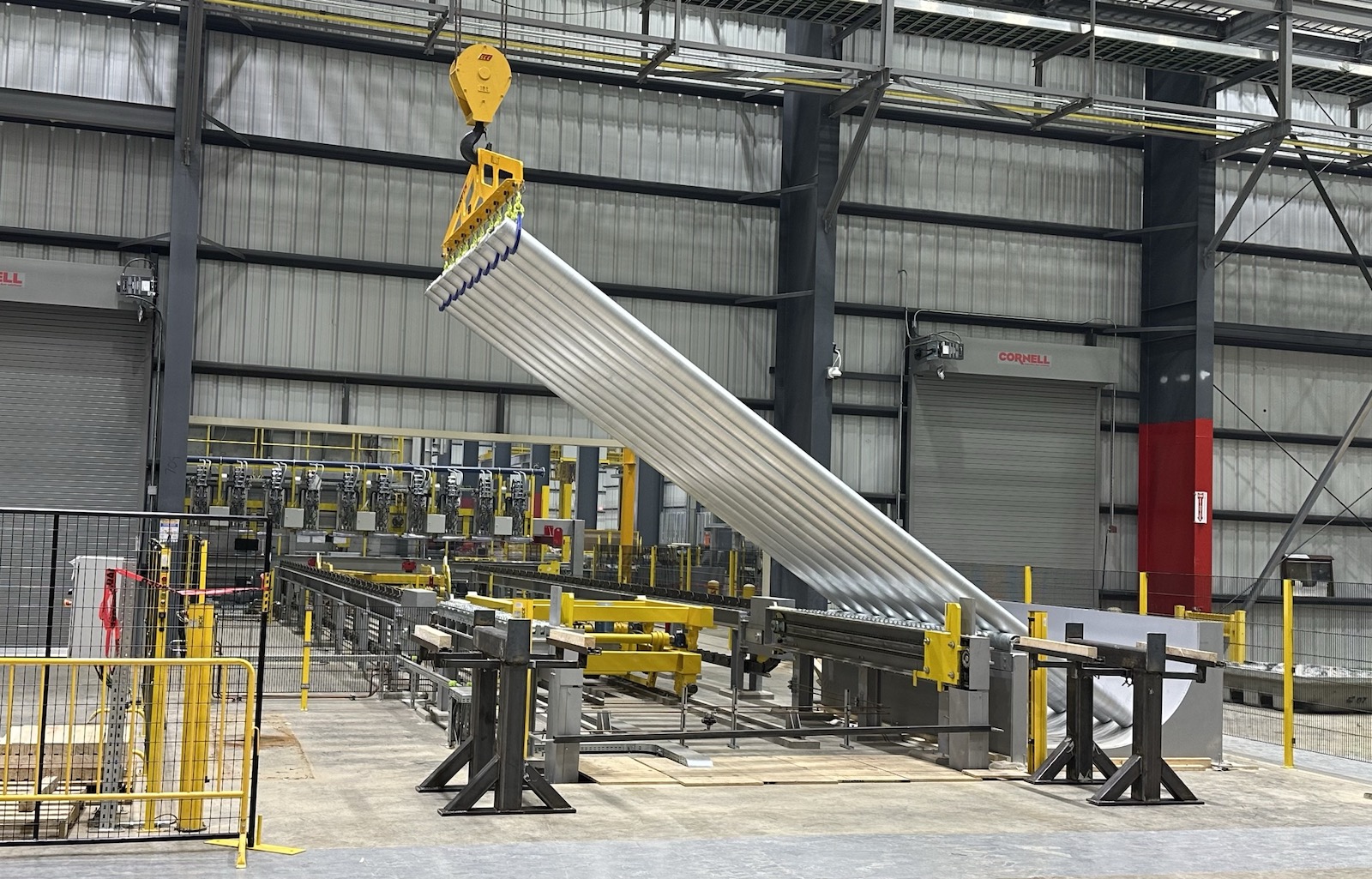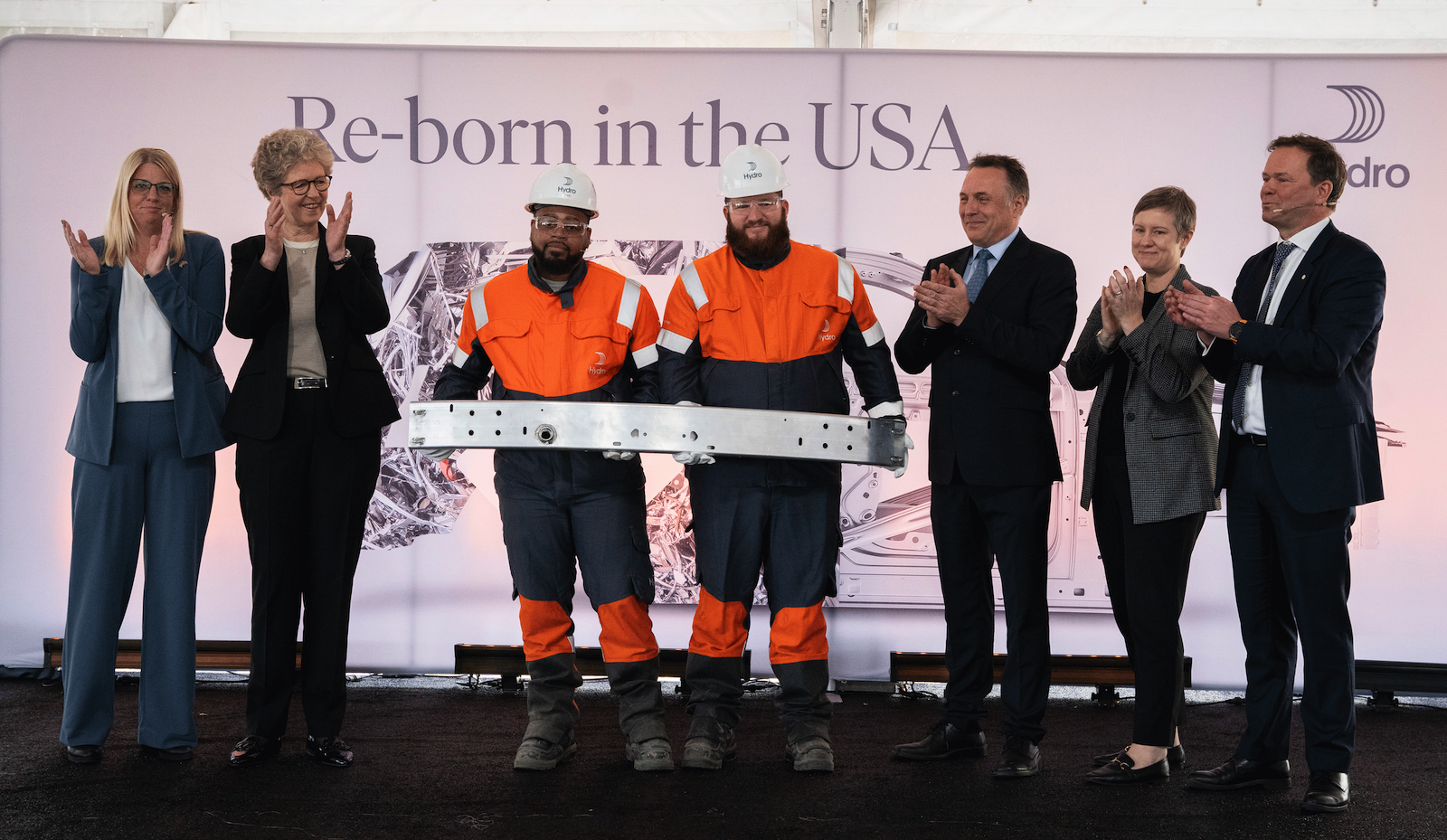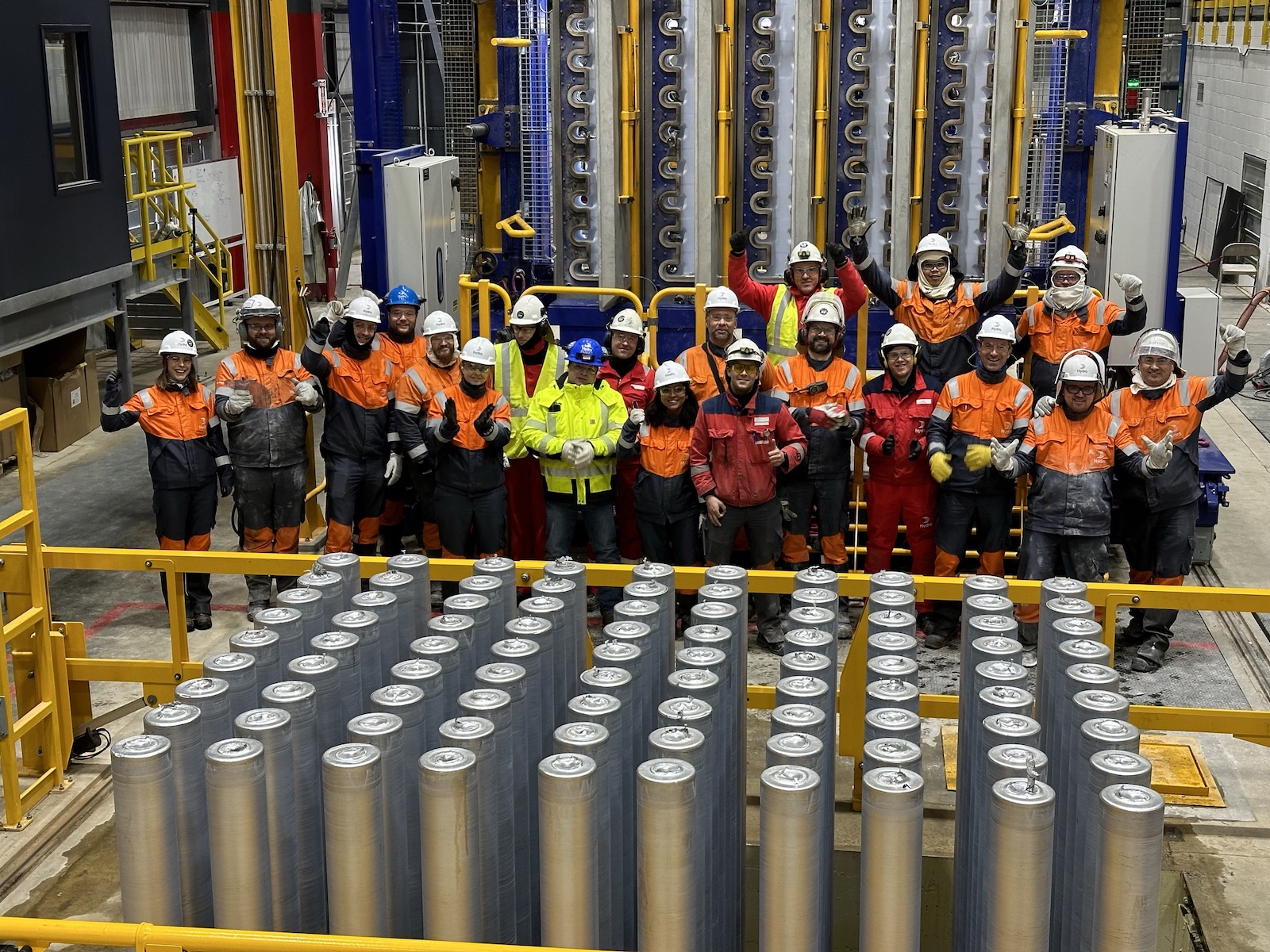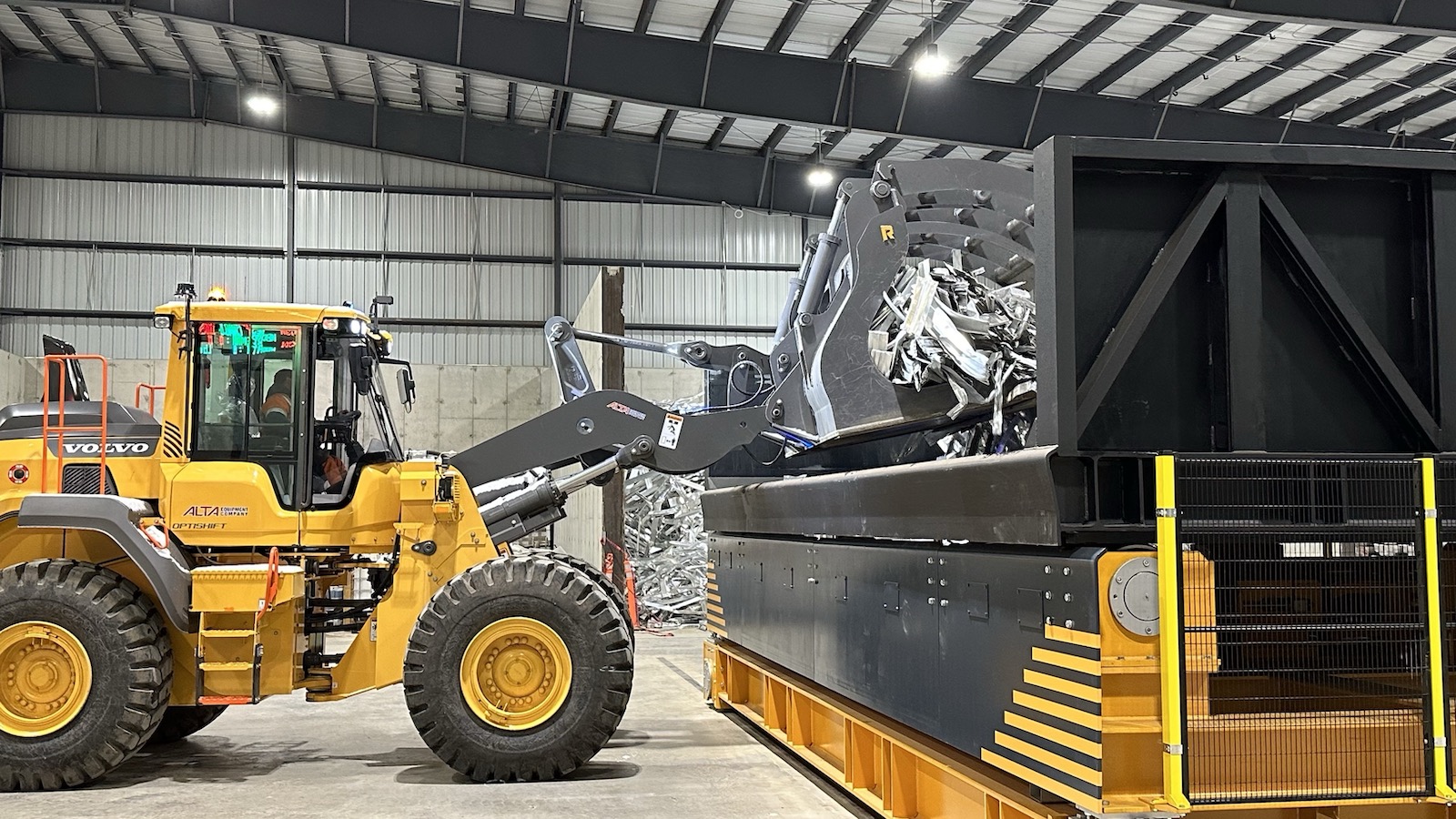
By Kevin Widlic, Contributing Editor.
The small Michigan town of Cassopolis — population 1,674 — is now home to a recycling plant that will produce 265 million lbs (120,000 tonnes) of aluminum extrusion ingot per year. Hydro celebrated the opening of the recycling plant on November 16 (Figure 1), just 18 months after breaking ground at the site.
On the sunny and warm November morning, Hydro president and CEO, Hilde Merete Aasheim, congratulated the 70 employees at the plant for their outstanding work during construction, as well as in the plant’s start-up phase. She also welcomed customers, local and state officials, and other community stakeholders to the opening ceremony.
“With the U.S. experiencing a manufacturing renaissance, this is a great day for Cassopolis and for Hydro,” said Aasheim. “Aluminum is a key enabler in the green transition, and recycling aluminum reduces energy consumption and greenhouse gas emissions while promoting a more circular economy. We are positioning ourselves to become the leading producer of low-carbon, recycled aluminum in North America. This plant in Cassopolis is going to be an example of sustainability and profitability going hand in hand.”

At Home with Automotive
Michigan is home to about 90% of the top 100 automotive suppliers to the U.S. For years, automakers have used aluminum to reduce the weight of combustion-powered vehicles, lowering emissions and increasing performance. Aluminum also plays a significant role in the lightweighting of electric and hybrid vehicles, which tend to be heavier than cars with internal combustion engines due to the weight of the batteries. “Efficiency is the goal for the industry going forward, and aluminum is the natural ally of efficiency. EVs are driving the use of aluminum,” said Abey Abraham of Ducker Carlisle, who spoke during Hydro’s customer seminar held on November 15, the day before the plant opening.
Hydro has a long history of partnering with automotive companies to develop innovative aluminum products for use in new cars. “The share of greener aluminum going forward is being driven by automotive,” said Chris Devadas, director of technology for Hydro Aluminum Metal in North America. “It is growing in all segments, but the volume growth is in automotive.”
The Cassopolis plant will make its initial deliveries to non-automotive customers, but once qualification trials are completed, the automotive industry will be the destination for more and more of the extrusion ingot produced in the plant.
“We are seeing interest from leading OEMs and aluminum extrusion companies, and we look forward to partnering with them to further expand production of automotive products with our new capabilities at Cassopolis,” said Eivind Kallevik, executive vice president responsible for Hydro Aluminum Metal.
Overview of the Recycling Plant
The Cassopolis plant is the third greenfield recycling plant Hydro has built in the U.S., and the first since 2002. It is also the first aluminum recycler in North America to serve as a large-scale producer of Hydro CIRCAL — extrusion ingot that contains at least 75% post-consumer scrap, as certified by third-party auditors DNV. The product is said to have a market-leading carbon footprint of 2.3 kg CO2e/kg aluminum.
Since recycling post-consumer scrap requires only 5% of the energy used to produce primary aluminum, saving energy and reducing greenhouse gas emissions, one-third of the production at the site will be dedicated to Hydro CIRCAL. The plant will produce billet in five dimensions, including 7 inch, 8 inch, 9 inch, 10 inch, and 12 inch (Figure 2). Cassopolis will produce a range of 6xxx series aluminum alloys, from 6063 building and construction alloys to more specialized alloys for automotive applications, such as 6008, 6110, and 6082, as well as alloys for wheel forging applications like 6099. This will enable the plant to serve a number of markets, while also supporting automotive innovation in Michigan and throughout the U.S.

The Cassopolis facility uses next-generation recycling technologies that were pioneered by Hydro in Europe. These include advanced processing technologies that enable the company to ensure the production of high-quality aluminum billet from post-consumer scrap. Hans Bjerkaas, head of operations for Hydro’s Recycling unit, explained that advanced sorting technology has become industry standard over the last decade — both in Europe as well as the U.S. That said, the main development has been in the utilization of sensor-based sorting such as x-ray transmission (XRT), which removes heavy metals like Cu and Zn. “We did not develop the sensor-based sorting, but we were one of the first to utilize it,” said Bjerkaas, who noted that TOMRA and Steinert have been the primary suppliers of sensor-based equipment like XRT.
Bjerkaas explained that the company will not do any sorting in Cassopolis, but that the design and selection of the equipment installed at the plant has been optimized for the utilization of significant volumes of shredded materials sorted by the technologies mentioned. The plant includes advanced melting and holding furnaces and casting equipment. In addition, the finishing area will comprise three batch furnaces, two cooling chambers, and laser marking.
Along those lines, he acknowledged the support of several suppliers that have been key to the Cassopolis project — first and foremost Ramboll. Hydro contracted Ramboll for engineering, procurement and construction management (EPCM) for the project, as well as for construction of the buildings and preparation of the site. “Ramboll is more or less the same company as the EPCM contractor we selected for the Commerce, TX, project we completed 20 years ago, so we knew they were capable of building a recycling plant—and with the same strong safety philosophy that we appreciate,” says Bjerkaas.
In addition, Hertwich Engineering supplied homogenization technologies for the plant, and Hycast provided the low pressure casting (LPC) system, which was developed by Hydro and will help to increase the range of alloys the site can produce. This patented technology provides superior results to most current best-in-class methods, according to Ulf Håkon Tundal, who works in Hydro’s R&D organization in Norway, specializing in extrusion ingot projects. “With LPC, as compared with a gas cushion, you get shorter butt-ends and fewer inflow-related surface defects,” said Tundal. “You also get higher extrusion speeds for wide profiles.” The technology is also known to produce high-quality billet with an excellent surface finish and microstructural uniformity over an extensive alloy range.
The new recycling facility also has local logistics and financial support. Located within the Midwest Energy and Communications (MEC) SMART Park in Cassopolis, the new plant will make use of the direct rail service at the SMART Park to bring supplies, thereby helping to lower the overall carbon footprint of its operations. Hydro also plans to partner with MEC to source renewable electrical power for the facility. In addition, Hydro’s $150 million investment in the new recycling plant has been supported through grants from the U.S. Economic Development Administration, as well as state and local incentives.
As part of the Cassopolis opening ceremony, Aasheim also welcomed the technical experts working at Hydro’s Aluminum Technology Center in Zeeland, MI. The team provides critical performance testing data to support Hydro’s production facilities and customers in the U.S., Canada, and Mexico in offering high performance aluminum products into demanding end markets such as automotive. The five-person team will be expanding and moving into a new lab and office space directly next to the Cassopolis plant. “Having this best-in-class technology center right next door will strengthen our ability to deliver on future growth plans in Cassopolis and in the U.S.,” said Aasheim.
Producing Low Carbon Billet
When melting and recycling post-consumer scrap, aluminum recycling facilities must also deal with the risk of additional contaminants, such as painted surfaces and organic matter. Principal engineer Helen Weykamp explains that what makes Cassopolis unique is the technology used in making the low-carbon recycled product Hydro CIRCAL (Figure 3). “Our delacquering and melting technologies are best-in-class, where we use the energy output from the combustible contaminants during delacquering for melting. This reduces our energy consumption by 30% while also improving metal recovery,” she said, adding that the system is fully automated, with melting performed continuously during charging, skimming, and metal transfer. In anticipation of the production at Cassopolis, Hydro had been delivering quantities of Hydro CIRCAL to U.S. customers from its plants in Commerce, TX, and Henderson, KY, for the past year and a half.

For the production of CIRCAL, the Cassopolis plant uses a mixture of scrap and a small amount of primary aluminum ingot as a feedstock. The plant receives its scrap supply from two main sources. One is post-consumer scrap, which is the material returned from the market for a second life. This is the fastest-growing scrap stream. The other main scrap stream is pre-consumer or industrial scrap, which comes directly from manufacturing processes. This is also a growing market, as it correlates with the growth in manufacturing activity.
The aluminum scrap is being sourced from Michigan and neighboring states. In addition to receiving process scrap from customers, Hydro intends to partner with scrap suppliers in the area to secure the material needed. “Our scrap is already here,” said Gary Curtis, who heads Schupan Industrial Recycling in nearby Kalamazoo, MI. “We are the first to deliver scrap here to Cassopolis.”
Hydro also recently formed a joint venture with PADNOS, a Michigan-based leader in recycling and scrap management. The companies will form Alusort LLC, which will utilize state-of-the-art technology to sort up to 20,000 tonnes of aluminum scrap per year. Alusort will mainly supply sorted aluminum scrap to Hydro’s recycling plants in Cassopolis, MI and Henderson, KY, which is important for the long-term supply of Hydro CIRCAL. The new venture may also provide aluminum scrap to other Hydro facilities in the U.S. and Canada, and other metal fractions will be sold to third parties
Aasheim stated that recycling scrap aluminum is clearly the way to go. “Recycling is the fastest way to zero emissions, and Hydro CIRCAL has a market-leading CO2 footprint,” she explained. “It is sold out in Europe. This is why we are investing here and at our other recyclers.”
Training Personnel
Having technology is one thing. Having competent people is another. Human resources manager Sandy Doroh said that she received nearly 1,300 applications for the 70 positions that were made available at the Cassopolis plant. Why?
“First, we provided an opportunity that did not exist before. Not just for people in Cassopolis, but also nearby small communities. People had the option to work closer to home, rather than having to drive 1-2 hours to get to work,” said Doroh. “Second, we represent something new. People like having an opportunity to work with state-of-the-art technology.”
Doroh further explained that applicants were interested in the fact that this would be a brand new facility. “It is also new in the sense that people are all new together, that each one of us is part of the team from the very start,” she explained. “There are no rookies—everyone is new—and we all get a chance to be part of something bigger than ourselves. There are also no bad habits or old habits.”
Training these people was a challenge for the company, particularly because their plant was under construction while they were being trained. This is where the Hydro network paid off. Each of the Cassopolis employees was able to receive extensive training from Hydro’s recycling plants in Kentucky or Texas or from plants in Norway and Europe. Training also was conducted in Cassopolis digitally through VR equipment or tablets. A benefit of this digital method is that the new employees could follow the same processes and routines that are in place at the other recycling plants around the world.
In total, plant manager Christopher Braathen said the company spent 15,000 hours on employee training prior to the start-up of operations. “We spent every available hour on training,” he explained. “One of our people had not even been on an airplane. She didn’t have a passport. The moment she got her passport, we sent her to Luxembourg for training at our Clervaux plant.”
A Good Neighbor in Cassopolis
Hydro is making efforts to not only bring more jobs to the local community, but to also be a good neighbor. Prior to the opening ceremony, Aasheim and Kallevik visited Cassopolis Ross Beatty High School to present the Cassopolis RoboRangers, the school’s first Robotics Team, with a $25,000 donation to support the team.
Last year, Hydro sponsored a tree planting with the Village of Cassopolis and Cassopolis Public Schools. The company also presented a donation to support the science, technology, engineering, arts and mathematics (STEAM) program in the elementary and middle schools, and provided the village with new outdoor furniture manufactured from Hydro CIRCAL.
“Hydro strives to be a good neighbor. It is in our DNA,” said Aasheim. “We look forward to continuing our work with the local community here to bring stable jobs and career opportunities, and to invest in local education with an eye toward the next generation of Hydro employees.”
A Leading Aluminum Recycler
With completion of the Cassopolis plant, Hydro is now able to manufacture over 1 million tonnes (2.2 billion lbs) of recycling-based aluminum billet each year in the U.S.—further strengthening its position as the largest producer of recycled billet in the country. With the launch of Cassopolis, the company now has 11 recycling operations throughout the U.S., as well as one in Canada. These plants remelt post-consumer aluminum scrap, as well as production scrap.
Along with a number of other recycling projects underway, the Cassopolis facility is a key part of Hydro’s ambition of doubling recycling of its recycling of post-consumer aluminum by 2025. Aasheim said that the company has invested some $600 million in sustainability-related projects in the U.S. alone over the past five years, and that Hydro intends to invest another $800 million during the next five years.
Editor’s Note: This article first appeared in the December 2023 issue of Light Metal Age. To receive the current issue, please subscribe.
